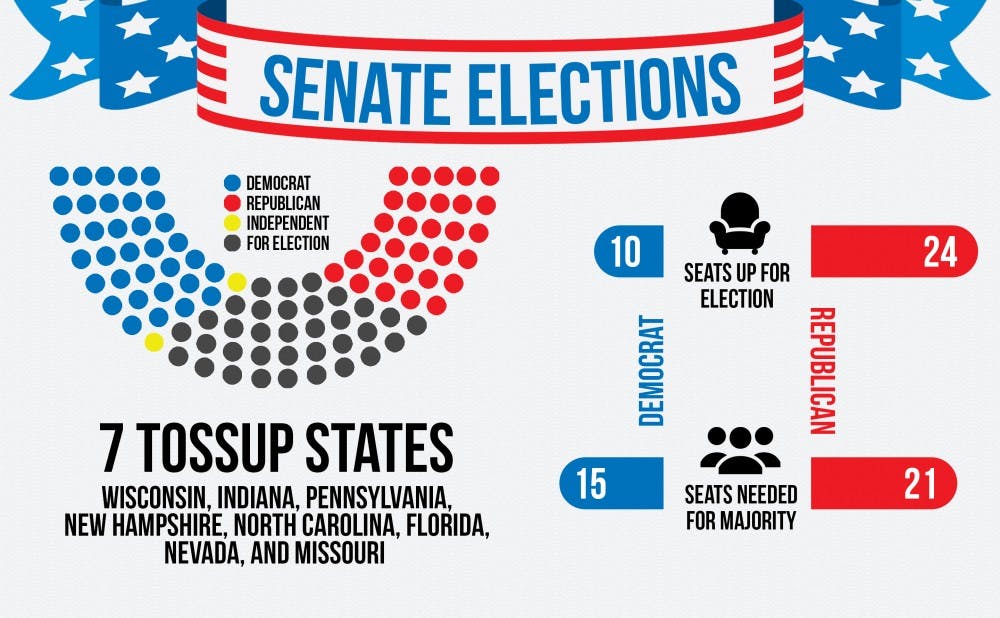While some pundits remain fascinated with the presidential election, others have turned their eyes to the Senate.
In November, Democrats will have 10 seats up for election, and Republicans are defending 24 seats.
Many of these races are not competitive. Democrats have greater than a 90 percent chance of winning the Senate seats in ten states: California, Vermont, New York, Hawaii, Maryland, Connecticut, Oregon, Washington, Colorado and Illinois, according to The Upshot. Republicans have at least an 89 percent chance of winning the Senate races in 16 races: Louisiana, Kentucky, Ohio, Arizona, Arkansas, Iowa, Idaho, Alaska, Alabama, South Dakota, Oklahoma, Georgia, Kansas, North Dakota, Utah and South Carolina.
This leaves eight states with competitive Senate races: Wisconsin, Indiana, Pennsylvania, New Hampshire, Nevada, North Carolina, Missouri and Florida. Democratic hopes of retaking the Senate rest on winning at least four of these races if Clinton becomes president—because the vice president breaks ties in the Senate—and five if she loses. Likewise, Republican chances hinge on holding Democrats to fewer than four gains.
David Rohde, Ernestine Friedl professor of political science, noted that the closest races will probably be Pennsylvania and New Hampshire and that Illinois and Wisconsin are the seats most likely to switch parties.
Dean Lacy—chair of the department of government at Dartmouth College and a 1994 Ph.D. graduate of Duke—also said that New Hampshire will be one of the tightest elections.
"There are a lot of registered independents, more independents than Democrats or Republicans," he said. "[Incumbent Republican Senator Kelly Ayotte] has done a good job positioning herself as a moderate, especially on social issues. She's also running against a popular Democratic incumbent governor with a lot of statewide name recognition. It's a tight race. It is really a tight race. I could make a prediction really either way.”
As Democratic chances of taking Senate seats in Florida and Ohio have faded, some previously quiet races have emerged as potential targets. Missouri's Democratic candidate, Jason Kander, is one such example.
Even so, Republicans are favored in Missouri, according to FiveThirtyEight. Timothy Lomperis—Ph.D. ‘81 and now professor emeritus of political science at Saint Louis University—noted in an email that the Republican candidate Roy Blunt will likely win.
“[Blunt] and Claire McCaskill (D-MO) are both moderates in their parties, and have broad enough electoral coalitions to have the advantage of incumbency,” he wrote. “Blunt, unlike Trump, does not have 'foot in the mouth' disease, so is unlikely to do anything to lose the advantage of Missouri's essential redness.”
Races where a Republican incumbent is likely to lose reelection could flip the Senate to the Democrats. In Illinois, Sen. Mark Kirk, the Republican incumbent, is running against Tammy Duckworth, U.S. representative. FiveThirtyEight reports that Duckworth has a 90 percent chance of winning the race.
“Tammy Duckworth is the likely winner,” said Bill Bernhard, Ph.D. ‘96 and associate provost for faculty development at the University of Illinois at Urbana-Champaign. “She is a decorated war hero. In a heavily Democratic state, she can count on the support of the party organization and loyal party voters to carry her through. The polls have her with a comfortable lead. It is hard to imagine that Mark Kirk will benefit from the turmoil in the GOP—he would need a huge turnout downstate and with the party in disarray. That is unlikely."
In North Carolina, Rohde said that the race is "closer than anyone expected it to be." He explained that Republican incumbent Sen. Richard Burr is facing a problem in that he is not very visible or well known to the electorate. FiveThirtyEight has Democratic challenger Deborah Ross with a 50.1 percent chance of winning the race.
According to The Upshot, Democrats have a 58 percent chance of winning the Senate overall.
Rohde explained that he thinks it is still hard to say whether the Senate will flip but noted that Democrats have some advantages working for them such as a number of races becoming more competitive for Republicans during the last month.
"Democrats have more options to get the seats they need," he said.
However, John Aldrich, Pfizer-Pratt University professor of political science, noted that neither presidential candidate stands a very good chance of working well with the current Senate or the new one.
"It's going to take, I think, changing the way the House and the Senate govern themselves and perhaps, electoral reforms that change how our campaigns are run," he said. "It's not something that the presidential administration can do much about."
Get The Chronicle straight to your inbox
Signup for our weekly newsletter. Cancel at any time.
Class of 2019
Editor-in-chief 2017-18,
Local and national news department head 2016-17
Born in Hyderabad, India, Likhitha Butchireddygari moved to Baltimore at a young age. She is pursuing a Program II major entitled "Digital Democracy and Data" about the future of the American democracy.

